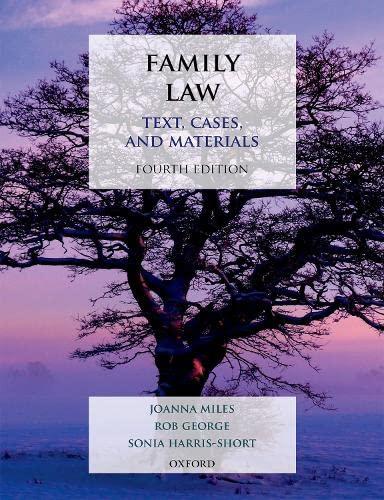Question
For questions 1-15, answer whether the contract is: A. Void B. Voidable C. Rescissible D. Unenforceable 1. A contract of sale where one party is
For questions 1-15, answer whether the contract is: A. Void B. Voidable C. Rescissible D. Unenforceable 1. A contract of sale where one party is a minor. 2. A contract undertaken in fraud of creditors when the latter cannot in any other manner collect the claims due them. 3. Contract where the consent is vitiated by mistake, violence, intimidation, undue influence or fraud. 4. A contract entered into the name of another person by one who has been given no authority or legal representation. 5. A contract whose cause, object or purpose is contrary to law, morals, good customs, public order or public policy. 6.A contract which are entered into by guardians whenever the wards whom they represent suffer lesion by more than one-fourth of the value of the thing 7. A contract which are absolutely simulated or fictitious 8. An oral contract for the sale of a house and lot in Carmela Homes Subdivision. 9. A contract where both parties are incapable of giving consent to a contract. 10. A contract whose object is outside the commerce of man. 11. An oral agreement made in consideration of marriage other than a mutual promise to marry 12. An oral agreement that by its terms is not to be performed within a year from the making thereof. 13. Those agreed upon in representation of absentees, if the latter suffer the lesion of 14 the value of the thing. 14. Those which contemplate an impossible service. 15. Those whose cause or object did not exist at the time of the transaction. 16. A contract where one party receives no valuable consideration and the cause is the liberality of the benefactor is A. A gratuitous contract C. An onerous contract B. A unilateral contract D. A commutative contract 17. The principle that contracting parties may establish such stipulations, clauses, terms and conditions as they may deem convenient, provided they are not contrary to law, moral, public policy and public order, refer to the principle of A. Liberty of contract C. Consensuality of contract B. Relativity of contract D. Mutuality of contract 18. The following instances will render an offer ineffective before acceptance is conveyed. Which one will not? When one of the parties A. Is civilly interdicted C. Becomes insane B. Becomes insolvent D. Is placed under a hypnotic spell 19. When there is concurrence of offer and acceptance, there is A. Payment C. Consent B. Consignation D. Tender of payment 20. If mistake, fraud, accident or inequitable conduct has prevented a meeting of the minds of the parties to a contract, the proper remedy is A. Ratify the contract C. Annulment of the contract B. Ask for a specific performance D. Reformation of the contract 21. The proper remedy is annulment of contract and not reformation when:
A. Mistake, fraud, inequitable conduct, or accident has prevented a meeting of minds of the parties. B. A mutual mistake of the parties causes the failure of the instrument to disclose their real agreement. C. One party was mistaken and the other knew or believed that the instrument did not state their real agreement, but concealed the fact from former. D. Answer not given. 22. The action to annul a voidable contract, such as a contract where one of the parties is incapable of giving consent to the contract, is extinguished by: A. Novation C. Ratification B. Rescission D. Answer not given 23. Cecilio kidnapped and tortured Eduardo for refusing to sell his (Eduardo's) land to Cecilio. Eduardo who could no longer bear the physical pains inflicted upon him signed a document of sale in favor of Cecilio. This sale is A. Void C. Valid B. Voidable D. Answer not given 24. Choose the contracts which are voidable. A. Those undertaken in fraud of creditors when the latter cannot in any manner collect the claims due them. B. Those where the consent is vitiated by mistake, violence, intimidation, undue influence of fraud. C. Those whose subject is outside the commerce of man. D. Those where both parties are incapable of giving consent to a contract. 25. Mr. Gamboa owes Mr. Evangelista P100,000. Gamboa knows that on maturity date, he will not be able to pay Evangelista, and in order to prevent attachment of his property by Evangelista, Gamboa, before maturity of his debt, executes a contract pretending to sell to Mr. Santiago his property. Which of the following statements is correct: A. The contract is not valid for lack of consideration B. The contract is binding between Gamboa and Santiago C. The contract being simulated and executed to defraud Evangelista is void. D. Mr. Evangelista can seek rescission of the fictitious contract.
Step by Step Solution
There are 3 Steps involved in it
Step: 1

Get Instant Access to Expert-Tailored Solutions
See step-by-step solutions with expert insights and AI powered tools for academic success
Step: 2

Step: 3

Ace Your Homework with AI
Get the answers you need in no time with our AI-driven, step-by-step assistance
Get Started


